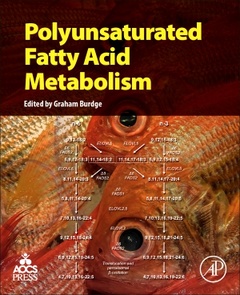Description
Polyunsaturated Fatty Acid Metabolism
Coordinator: Burdge Graham C.
Language: English
Subjects for Polyunsaturated Fatty Acid Metabolism:
Keywords
<; P>; biosynthesis; delta-6 and delta-5 desaturases; dietary modification; endocrine; eukaryotes; elongase 2 and 5; PUFA; lipid second messengers; dietary supply; endogenous synthesis; long chain polyunsaturated fatty acids; hormones; genetics; dietary factors; metabolism; epigenetic regulation<; /P>
252 p. · 15x22.8 cm · Paperback
Description
/li>Contents
/li>Readership
/li>Biography
/li>Comment
/li>
Polyunsaturated Fatty Acid Metabolism explores a number of major roles of PUFA in the body, including its role as a component of cell membranes and how it provides substrates for the synthesis of lipid second messengers. Recent studies are unraveling the effect of interactions between diet and endocrine factors and genetic and epigenetic variation on the regulation of PUFA biosynthesis in animals. Together, these recent findings provide novel insights into the impact of differences in PUFA supply on health. This book captures these findings in a manner that marks the state-of-the-art, placing them in the wider context of PUFA metabolism and nutritional science.
Users will find a comprehensive discussion on the topic that presents the contributions of leading researchers who combine their knowledge to create a cohesive academic resource for researchers, those involved in production, and health policymakers.
2. Polyunsaturated fatty acid biosynthesis in fish –an overview
3. Polyunsaturated fatty acid biosynthesis in birds
4. Biochemistry and regulation of delta-6 and delta-5 desaturases in animals
5. Biochemistry and regulation of elongase 2 and 5 in mammals
6. Polyunsaturated fatty acid biosynthesis in infancy
7. Alternative pathways of polyunsaturated fatty acid biosynthesis in eukaryotes
8. Endocrine influences on polyunsaturated fatty acid biosynthesis
9. Dietary modification of polyunsaturated fatty acid biosynthesis
10. Genetic influences on polyunsaturated fatty acid biosynthesis
11. Epigenetic influences on polyunsaturated fatty acid biosynthesis
12. Implications of polyunsaturated fatty acid metabolism for human health
Researchers in nutrition and food chemistry, as well as those scientists involved in establishing health standards for policy purposes
- Provides a comprehensive view of polyunsaturated fatty acid metabolism
- Describes underlying metabolism on lipids that include polyunsaturated fatty acids
- Includes discussions on recent findings on the genetic and epigenetic regulation of polyunsaturated fatty acid metabolism




